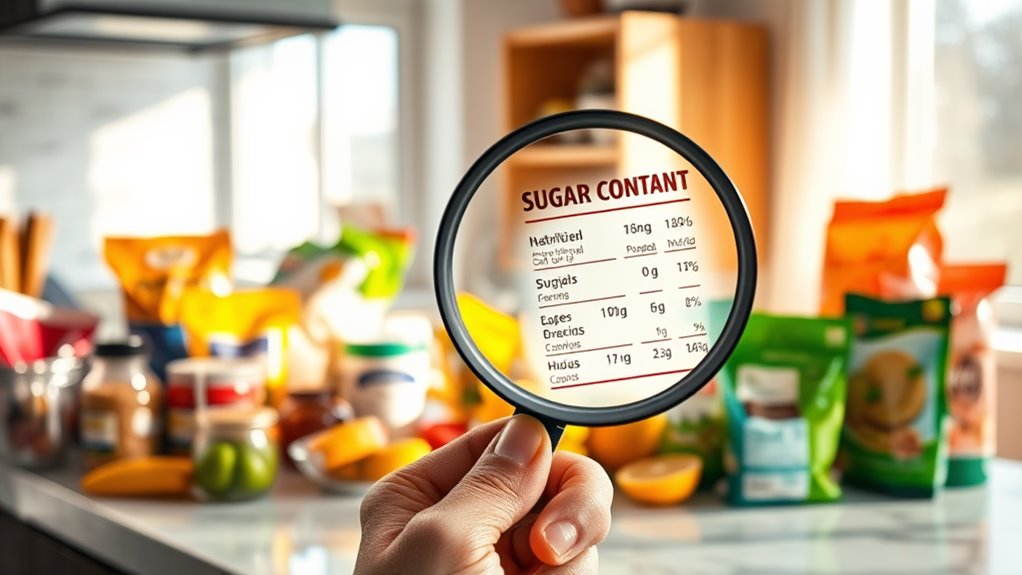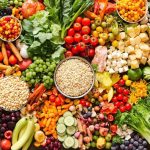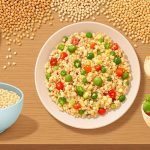
To effectively manage your sugar consumption, start by checking nutrition labels for added sugars and aim to keep them below 10% of your daily calorie intake. Opt for whole foods like fruits and vegetables for natural sweetness. Switch out sugary drinks for unsweetened tea or coffee, and snack on fresh fruit or nuts instead of sweets. Use natural flavor enhancers, like cinnamon, to reduce sugar in recipes. Gradually decrease sugar in your diet to adjust your taste preferences. Staying mindful and planning meals can curb impulsive sugary choices. Embracing these strategies can lead to a healthier lifestyle and more insights.
Understanding Sugar Intake
Imagine a spoonful of sugar in your morning coffee; it seems harmless but can quickly add up, impacting your daily sugar intake. Grasping the intricacies of sugar metabolism is your first step towards freedom from its potential health risks. When you understand these implications, you’re better equipped to make empowering choices. The American Heart Association advises no more than 6 teaspoons of added sugar daily for women and no more than 9 for men. Aligning with these guidelines can help mitigate the dangers of sugar on your health, including weight gain and type 2 diabetes. Health education is crucial for maneuvering the labyrinth of added sugars lurking in your diet. It’s essential to develop a positive relationship with food to manage sugar intake effectively. For those unsure of an added sugar source, sauces & condiments such as ketchup and barbecue sauce can surprisingly contain high sugar levels. Sugar-sweetened beverages like sodas, and sweetened teas, rank among the most significant culprits, stealthily disrupting a balanced sugar metabolism. Desserts and sweet snacks follow closely, often tempting you with their sweetness. But remember, the freedom to opt for healthier lifestyle choices lies in your hands. Keep vigilant over Nutrition Facts labels and ingredient lists to identify hidden sugars masquerading under names like high fructose corn syrup or honey. Liberating yourself from excessive sugar begins with informed decision-making and self-awareness.
Smart Substitutions
Healthy dietary choices often hinge on making smart substitutions for sugar. If you’re aiming for a lifestyle that feels freeing and in control, considering natural sweeteners and sugar alternatives is the key. Instead of reaching for that refined sugar, indulge in whole foods. Fruits, veggies, whole grains, and nuts offer natural sweetness, satisfying your cravings without post-sugar guilt. They pack fiber, vitamins, and antioxidants—benefits sugar just can’t offer.
When you choose whole foods to appease your sweet tooth, you’re not just curbing sugar; you’re embracing freedom from unnecessary sugar alternatives and the cycle of cravings. It’s essential to be mindful, as the cumulative intake of sweeteners can be significant, and uncertainty exists regarding the threshold for negative health effects. A balanced diet rich in whole foods supports metabolic health and overall well-being.
Yet, understanding sugar substitutes can empower your dietary decisions. Artificial sweeteners like aspartame and sucralose, novel sweeteners from natural sources like stevia and monk fruit, and sugar alcohols each bring unique uses and benefits. Though these substitutes may help slash sugar intake and even lower blood sugar levels, remember moderation is key. Natural sweeteners can transform your journey, offering sweetness and health benefits without the drawbacks of overconsumption.
Unleash the power of smart substitutions in your diet. Explore the spectrum of options available, and let your taste buds experience sweet liberation.
Label Awareness

When it comes to managing your sugar intake, understanding nutrition labels is a powerful tool. They’re your secret weapon for identifying total and added sugars in products, giving you the power to make informed choices. Just imagine breaking free from hidden sugars by decoding label formats and ingredient names. Labels don’t just list sugars like sucrose, fructose, or glucose; they’re a beacon, showing if those sugars are naturally occurring or added. Added sugars are essential to track as dietary guidelines recommend keeping them below 10% of your daily calorie intake. Ingredient names can be tricky, hiding sugars in plain sight. Catching them listed as maltose, dextrose, or even sorbitol is liberating. With multiple sugar sources, a product might’ve more than you think. High consumption of added sugars is linked to metabolic disorders and chronic diseases. Different label formats, such as front-of-package labels or color-coded warnings, simplify comparisons. Imagine a traffic light label signaling sugar content, making that decision at the store instant. Understanding the adaptability of metabolism can provide insights into how individual responses to dietary changes can affect overall health.
Healthy Habits
As you work towards managing sugar consumption, adopting healthy habits is essential. Mindful eating empowers you to break free from sugar’s hold. Start by being present while you eat—ditch distractions like phones or TV, and truly savor each bite. Be aware that emotional connections to food can sometimes heighten sugar cravings, making it crucial to recognize and address such triggers.
Alongside mindful eating, meal planning is your secret weapon. Plan your meals ahead to prevent impulsive sugar-laden choices. When you prepare your own meals, you control the ingredients, enabling a strategic reduction in sugar intake. Excessive sugar intake is linked to numerous health issues such as heart disease, stroke, and obesity, reinforcing the importance of being mindful about sugar consumption.
Gradually decrease sugar in your diet. Cut back slowly to acclimate your taste buds to less sweet flavors. Baking at home? Halve the sugar without compromising on taste, and explore the natural sweetness found in fruits. Spice up dishes with cinnamon or nutmeg instead of sugar to free your taste buds from dependency on added sugars.
Transform your beverage habits. Choose water as your go-to drink and enhance it naturally with lemon or strawberries. Avoid the sugary quagmire of sodas and fruit juices, opting instead for unsweetened tea or coffee.
Specific Food Choices

Many foods, while seemingly innocuous, hide significant amounts of sugar. Beverages like soft drinks, fruit juices—even those boasting 100% juice—are culprits. Sweetened coffees, teas, and sports drinks can quickly max out your daily sugar limit.
But freedom from sugar overload starts with mindful eating and making clever swaps. Opt for sugar alternatives by choosing unsweetened tea or coffee, or hydrate with water infused with fresh lemon or cucumber. Seltzers and sparkling water also offer revitalizing options without the sugar trap.
When it comes to snacks and desserts, liberation from sugar’s grip becomes simpler with fresh fruit, Greek yogurt with cinnamon, or roasted nuts. Replace high-sugar sweets with occasional dark chocolate or a baked fruit treat paired with plain yogurt.
Meal-wise, select whole grain cereals under six grams of sugar per serving, and enjoy lean proteins like grilled chicken alongside vibrant vegetables. Insufficient consumption of fruits, vegetables, and whole grains can lead to constipation and other health issues.
Reading nutrition labels empowers you in identifying added sugars hidden behind names like high fructose corn syrup and dextrose. Choose whole, unprocessed ingredients to jubilantly break free from unnecessary sugars.
Public Health Strategies
Your personal food choices are just one piece of the puzzle in managing sugar consumption; public health strategies play an essential role in shaping healthier community environments. Embrace the power of policy interventions to limit your sugar intake.
Governments can reformulate products, cutting added sugars in everyday items. Imagine living with clear standards for food served in public institutions, ensuring we’re consuming fewer hidden sugars. By supporting sugar taxes, you help reduce the temptation of sugary treats and improve overall well-being.
Community engagement ignites change, creating healthier spaces for everyone. Picture programs that replace sugary drinks and snacks in schools or healthcare settings with nutritious options.
Envision public institutions emphasizing low-sugar choices, making it easier for you to make smart dietary decisions. Together, community-driven initiatives push for easily accessible and transparent nutrition labeling. With informed choices, you’re empowered to stand up to marketing bombarding children with sugar-rich products.
Harness collective strength with awareness campaigns, learning to interpret labels and opting for a healthier future. Advocate for embedding nutrition education within schools and workplaces.
Sugar Moderation Ensures Health

Maintaining a moderate intake of sugar is essential for preventing health risks associated with excessive consumption, such as obesity, type 2 diabetes, and heart disease. By adhering to guidelines that suggest limiting refined sugar to 10% of daily energy intake and no more than 50 grams for adults, individuals can markedly reduce their risk of chronic diseases and promote overall well-being.
The World Health Organization’s strong recommendation to curtail free sugar intake aligns with strategies that prioritize whole foods and natural sugars from fruits and vegetables, offering sustainable ways to control sugar-related health issues.
Implementing effective sugar moderation starts with understanding food labels and identifying hidden sugars in everyday products. Gradual changes, such as reducing sugar in beverages and opting for satisfying alternatives like fresh fruits or healthy snacks, help curb cravings without compromising sustainability.
Emphasizing nutrient-dense whole foods over processed ones guarantees a balanced diet, contributing to better energy regulation, dental health, and weight management. These efforts, coupled with regular monitoring and professional advice, empower individuals to manage their sugar intake consciously, paving the way for improved health outcomes.
This thorough approach to sugar moderation underscores the importance of making informed dietary choices. By integrating these strategies into daily habits, individuals can foster a healthier relationship with sugar, ultimately enhancing their overall quality of life and setting a foundation for a future free from sugar-related health complications.
Whether through small incremental changes or broader lifestyle adjustments, embracing moderation delivers remarkable progress toward achieving and maintaining ideal health.














